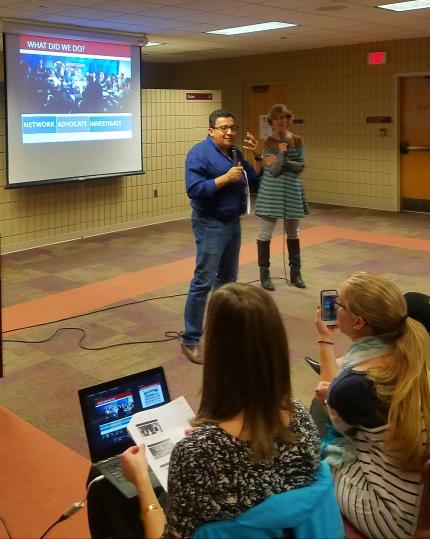AJS Leaders at Calvin: Dismantling Police Corruption in Honduras

Carlos Hernandez speaks to students. Jo Ann Ver Beek is in the background.
Chris Meehan
Alejandro Rafael Vargas Castellanos and his friend Carlos David Pineda Rodríguez were on their way home from a birthday party in October 2011 when police in Tegucigalpa, Honduras, tried to stop them.
Fearing what the police might do, the two college students fled, and the police chased them down, dragged them from their car, and then took them to a remote area and killed them, said Carlos Hernandez, president of the Association for a More Just Society (AJS) in Honduras.
According to some news accounts, police wanted to kidnap Castellanos in retribution for the human rights work of his mother, Julieta, who was president of the country’s largest university and was actively fighting against violence in the country.
Although some of the police eventually confessed to killing the college students, “the murders caused widespread concern and condemnation and calls for change,” said Hernandez, cofounder of AJS along with Kurt Ver Beek, a Calvin College sociology professor and director of Calvin’s Honduras Program.
Besides its connections to Calvin, AJS partners in doing work in Honduras with World Renew.
As a result of the murders of the young men, AJS connected with Julieta Castellanos, who played a key role in helping the organization become part of a process that led to the formation of a national commission charged with investigating corruption in the Honduran police department.
“We felt helpless losing the youth of our country to violence. We wondered what we could do when crimes like this were happening,” said Hernandez, who was in Grand Rapids, Mich., and Chicago recently to speak to AJS supporters about his work on the commission.
When they began working as a commission, he said, they sought information from the public on corrupt police officers. Information came into the AJS office in various ways and helped the commission determine who to investigate and who needed to be removed.
Among other things, they found police officers with links to the MS-13 international crime gang, as well as police who had worked as hitmen and assassins.
It was dangerous work for the commission.
After their involvement in having three top generals removed from the National Police in June of 2016, Hernandez and his family received threats on their lives. So did the family of Omar Rivera, an AJS leader and a member of the police commission.
After that, the families left the country for a few months and relocated with the help of the Christian Reformed Church in North America.
Then in December 2016, assassins attacked the vehicle in which Pastor Jorge Machado, an AJS board member and a member of the commission, was riding. The bullets didn’t kill him, but one of Machado’s bodyguards was killed, and another was severely wounded.
Still, the commission kept working, and over the past three years, said Hernandez, they removed more than 4,000 police officers, many of them high-ranking officials, from the police forces for various instances of wrongdoing, including drug trafficking, extortion, and murder of public figures.
“Being part of this was absolutely the biggest challenge of my lifetime and for AJS,” said Hernandez, speaking to a group over lunch in the Chapel Undercroft at Calvin College in Grand Rapids. “We were standing up to some of the most powerful and violent people in Honduras.”
On a video shown at the AJS gatherings, U.S. Ambassador to Honduras James D. Nealon said that AJS and Carlos Hernández, Omar Rivera, Kurt Ver Beek, and others “have been right at the very forefront of that process of changing the culture of the Honduran National Police so that it does serve the interest of the citizenry.
“That has been a challenging and difficult process. It’s not going to happen overnight. It takes long-term commitment. It takes big brainpower. It takes creative ideas, and it also takes a lot of personal courage.”
When the commission started, said Hernandez, the homicide rate in Honduras was one of the highest in the world, at 86 deaths per 100,000 people. In 2017 the rate was 42, and they want to get it down further.
“Our work has saved lives, but we still have a serious problem with violence in Honduras,” said Hernandez.
So far, they have advocated for and won passage of new laws and standards that will help shape the formation of the police force from here on. As part of this, they want to boost pay for officers who are struggling at or are barely above the poverty line.
Police and security experts from many countries are now visiting or contacting AJS to inquire about how the commission was put together and how it conducted its work. Calvin College, said Hernandez, will be publishing information on what happened and how the commission operated.
In addition, because of this work, Hernandez has been asked to speak all over the world about security, justice, and transparency in the police force.
“Our work shows that as Christians we can make a difference,” said Hernandez. “We want to see Honduras become a country of peace where young people will not be victims of murder and so the world can see what Christians can do — that with God we can do many things.”


